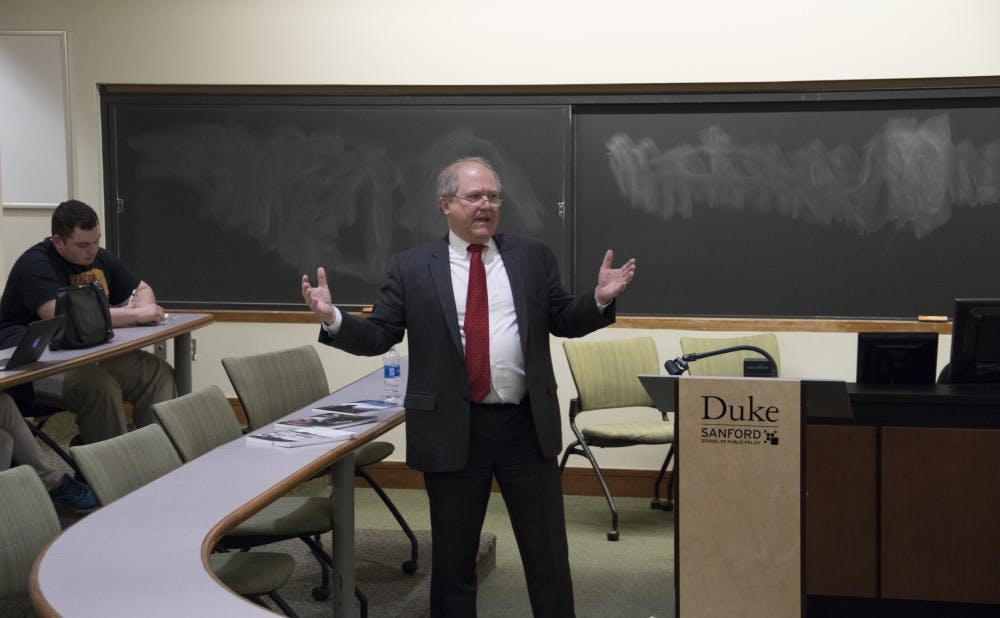American taxpayer money has been mismanaged in the 15-year “forgotten war” with Afghanistan, said John Sopko, special inspector general of Afghanistan reconstruction.
At a talk Thursday, Sopko laid out the extent of this mismanagement. As one of more than 70 inspectors general in the U.S., Sopko spoke about his experience identifying waste, fraud and abuse in the Afghan government's spending on defense procurement and infrastructural development. Sopko noted reluctance among the Department of Defense, the State Department and the U.S. Agency for International Development to critically assess the success of their projects in Afghanistan, and he proposed that the U.S. government focus on reducing corruption.
“As an inspector general, I don’t do policy. I do process,” Sopko said. “It’s not my job to decide or to tell you whether we should be in Afghanistan or how much money to spend there. Yet as an observer, you can identify certain things that we need to do so that the Afghan government can stand eventually on its own two feet.”
Sopko recounted an email he wrote in 2013 to the heads of the Department of Defense, the State Department and USAID requesting that they rank their top 10 successes and failures. In addition to receiving no response, the senior official to USAID said that Sopko was being “unfair" and that the request was like asking a parent to decide which of their children was better.
“It’s probably indicative of what’s wrong with Washington and what’s wrong with the way our government works—that they can’t rack and stack success or failure,” Sopko said. “I never thought development aid was the 'Sophie’s choice' of government assistance.”
Sopko also highlighted the need to address corruption in the Afghan government, noting that there are more than 1,000 generals in the Afghan army, some of whom have bribed or used personal connections to secure their positions.
Rigorous human resource practices could help solve the problem, he explained.
“Commanders in the Afghan military steal the food that you pay for and force their soldiers to buy it back. We hear story after story of commanders who steal the fuel, sell it to the Taliban, who take the weapons we—you—pay for and sell it to the Taliban,” Sopko said. “The irony of it is, the terrorists are at the end of our supply chain.”
Sopko proceeded to discuss a series of unsuccessful projects in Afghanistan. This included spending $400 million on the retrofitting 20 Italian cargo planes that turned out to be inappropriate for Afghan terrain and had to be scrapped for an additional $100,000—"an affront to the American taxpayer," he said.
Other notable cases included the expenditure of $6 million to transport and build infrastructure for “a handful of rare, sexy white Italian goats” to breed with “slower, less frisky Afghan goats” to improve Afghanistan’s cashmere industry, and the Department of Defense Task Force’s construction of a $43 million compressed natural gas station. Because no cars in Afghanistan ran on CNG, Sopko said, the U.S. government was obliged to spend more to retrofit local taxis to run on natural gas.
“I am not convinced that flying rare, Italian, even sexy white goats at U.S. taxpayers’ expense is what our founding fathers thought was the purpose of the U.S. military,” Sopko quipped.
Sopko's next report will detail the billion-dollar expenditures in Afghanistan, he added.
“It’s going to be fun on the one hand," he said. "it’s going to be sad on the other when you realize it’s your money."
Although corruption influenced the Afghan army's failures, Sopko noted that stupidity was influential as well. He criticized U.S. efforts to establish a central government, which he said was “anathema” to their system of “provincial leaders."
Moreover, criticisms of the U.S. mission in Afghanistan—such as the misguided emphasis on central government—and the importance of tackling corruption were detailed in a report on reconstruction efforts in Afghanistan from 1950-79. But Sopko said he “couldn’t find a soul in USAID” who had read the report.
“When I took this job, I learned about Afghanistan. Why didn’t anybody we sent over there do that?” he said. “We prepared a report, and nobody ever read it. It’s not corruption—it’s stupidity.”
Among Sopko’s recommendations were to certify that programs have clearly defined objectives, to consistently monitor progress and to coordinate programs between the U.S. government, Afghan government and international donors.
In formulating better policies for the U.S. mission in Afghanistan, Sopko also called for greater bipartisan collaboration.
The need to “rack and stack” successes and failures in Afghanistan is especially pressing, given President Donald Trump’s recent budget plan, which proposes cuts to spending on foreign assistance.
“With a new administration and a new Congress, it is an opportune time to reevaluate our efforts in Afghanistan and answer the simple question—what works, what doesn’t and why?” Sopko said. “That’s the exercise I asked the Head of Defense, Head of State and USAID. It would be nice if they answered the question.”
Get The Chronicle straight to your inbox
Signup for our weekly newsletter. Cancel at any time.

